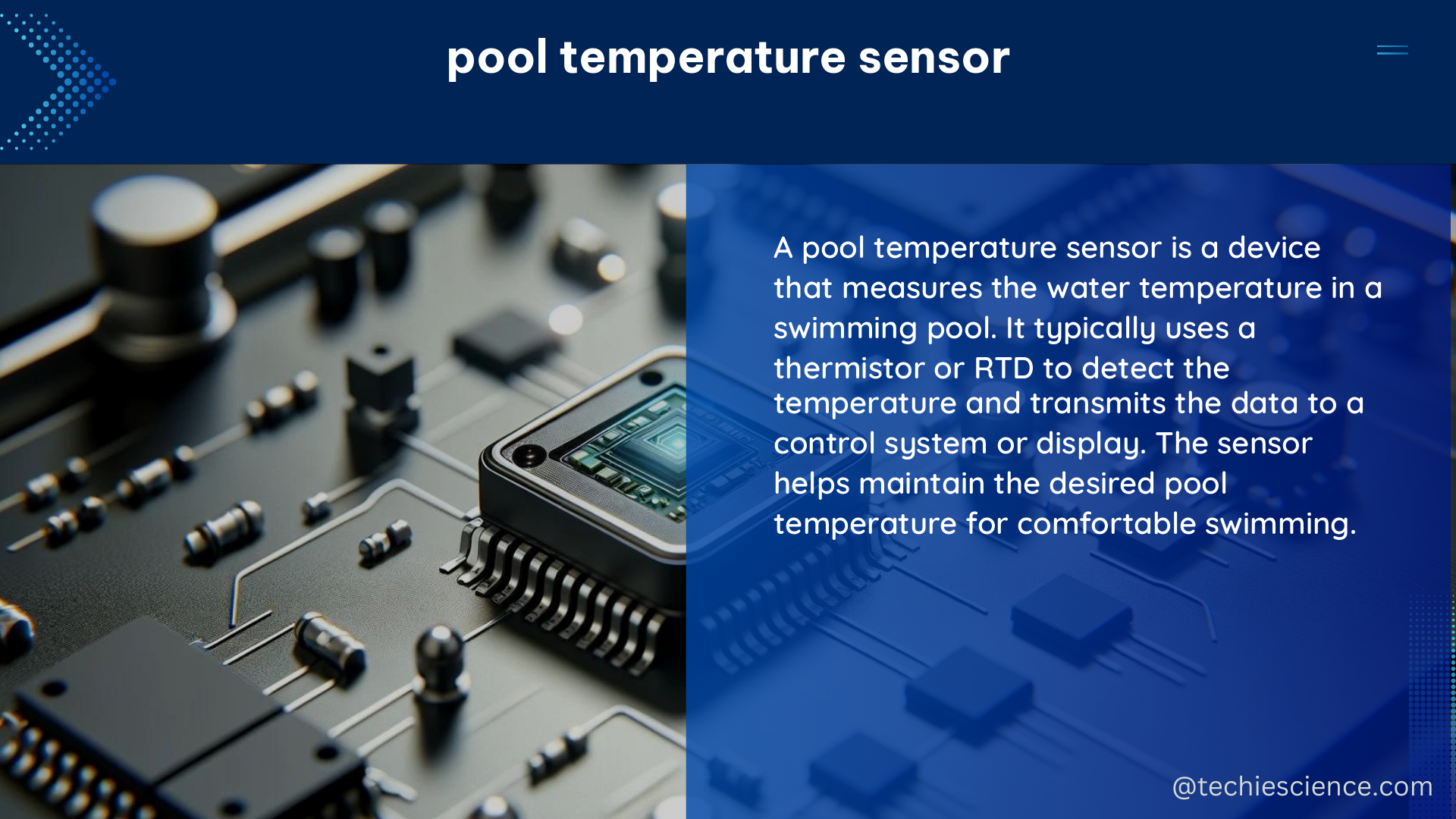The pool temperature sensor is a crucial component in maintaining the ideal water temperature for pool users. It is a device that precisely measures the temperature of the pool water and transmits this data to a control system, enabling the activation or deactivation of pool heating or cooling systems to ensure a comfortable swimming environment.
Understanding Pool Temperature Sensors
Pool temperature sensors come in various forms, each with its own unique features and capabilities. These sensors are designed to withstand the harsh conditions of a pool environment, including exposure to chlorine, fluctuations in water temperature and pressure, and other environmental factors.
Cloud-based Sensors
One example of a pool temperature sensor is the YouLink device, which is recommended for integrating pool water temperature into Home Assistant. This cloud-based sensor offers great distance and easy setup, allowing it to be placed in the pool skimmer or even in a refrigerator. The integration with Home Assistant is straightforward, making it a popular choice for smart home enthusiasts. However, its cloud-based nature may not be suitable for critical applications that require real-time data.
Wireless and Battery-powered Sensors
Another example is the DS18B20 temperature sensor, which can be used with an ESP module to measure pool water temperature. This sensor is battery-powered and wireless, making it an ideal choice for outdoor use. It can be seamlessly integrated into Home Assistant using the Dallas Temperature Sensor platform.
Measuring Air Temperature
Pool temperature sensors can also be used to measure air temperature, which can be valuable for monitoring weather conditions and adjusting pool heating or cooling accordingly. For instance, if the air temperature is significantly lower than the pool water temperature, heat loss may occur, necessitating the activation of the heating system to maintain the desired water temperature.
Monitoring Solar Heating Systems
Pool temperature sensors can also be utilized to measure the temperature of water from solar heating systems. By comparing the temperature of the solar-heated water to the actual pool temperature, a control system can determine when to activate the pump to circulate the heated water into the pool. This can help optimize the use of solar heating and reduce energy costs.
Selecting the Right Pool Temperature Sensor

When choosing a pool temperature sensor, it is crucial to consider several factors to ensure optimal performance and compatibility with your pool’s control system.
Accuracy and Range
The accuracy and temperature range of the sensor are essential. Pool temperature sensors typically provide temperature readings in degrees Celsius or Fahrenheit, which can be used to calculate the difference between the actual pool temperature and the desired temperature, as well as the rate of temperature change over time.
Battery Life and Power Source
The sensor’s power source and battery life are also important considerations. Battery-powered sensors, such as the DS18B20, offer the convenience of wireless installation, but their battery life must be taken into account. Alternatively, sensors that are wired to a power source may provide a more reliable and consistent performance.
Integration and Compatibility
The ease of integration with your pool’s control system is another crucial factor. Sensors that seamlessly integrate with popular home automation platforms, like Home Assistant, can simplify the installation and configuration process, allowing for better monitoring and control of the pool’s temperature.
Environmental Durability
The sensor’s ability to withstand the harsh pool environment is also a key consideration. It should be able to resist the effects of chlorine, UV exposure, and other environmental factors to ensure reliable and long-lasting performance.
Optimizing Pool Temperature Management
By utilizing pool temperature sensors, pool owners can optimize their heating or cooling systems and maintain a comfortable swimming environment. The data collected from these sensors can be used to:
- Monitor Temperature Trends: Track the pool’s temperature over time to identify patterns and optimize heating or cooling schedules.
- Detect Temperature Fluctuations: Quickly identify and address any sudden changes in water temperature that may indicate issues with the heating or cooling system.
- Integrate with Automation Systems: Seamlessly integrate the pool temperature sensor data with smart home platforms, such as Home Assistant, to automate temperature control and optimize energy usage.
- Enhance Solar Heating Efficiency: Monitor the temperature of solar-heated water and optimize the circulation to maximize the use of renewable energy sources.
- Maintain Ideal Water Temperature: Ensure that the pool water remains at the desired temperature, providing a comfortable and enjoyable swimming experience for users.
Conclusion
Pool temperature sensors are an essential component in maintaining the ideal water temperature for pool users. By understanding the different types of sensors, their features, and the factors to consider when selecting one, pool owners can make informed decisions and optimize their pool’s temperature management. With the right pool temperature sensor in place, you can create a comfortable and energy-efficient swimming environment that meets the needs of your pool users.
References
- Pool water / air temperature in HA – Home Assistant Community: https://community.home-assistant.io/t/pool-water-air-temperature-in-ha/504783
- Raspberry Pi Project: Wireless Pool Temperature Sensor: https://forums.raspberrypi.com/viewtopic.php?t=117812
- How to measure outside Pool Temperature? Battery driven and wireless: https://community.openhab.org/t/how-to-measure-outside-pool-temperature-battery-driven-and-wireless/102501/21

The lambdageeks.com Core SME Team is a group of experienced subject matter experts from diverse scientific and technical fields including Physics, Chemistry, Technology,Electronics & Electrical Engineering, Automotive, Mechanical Engineering. Our team collaborates to create high-quality, well-researched articles on a wide range of science and technology topics for the lambdageeks.com website.
All Our Senior SME are having more than 7 Years of experience in the respective fields . They are either Working Industry Professionals or assocaited With different Universities. Refer Our Authors Page to get to know About our Core SMEs.